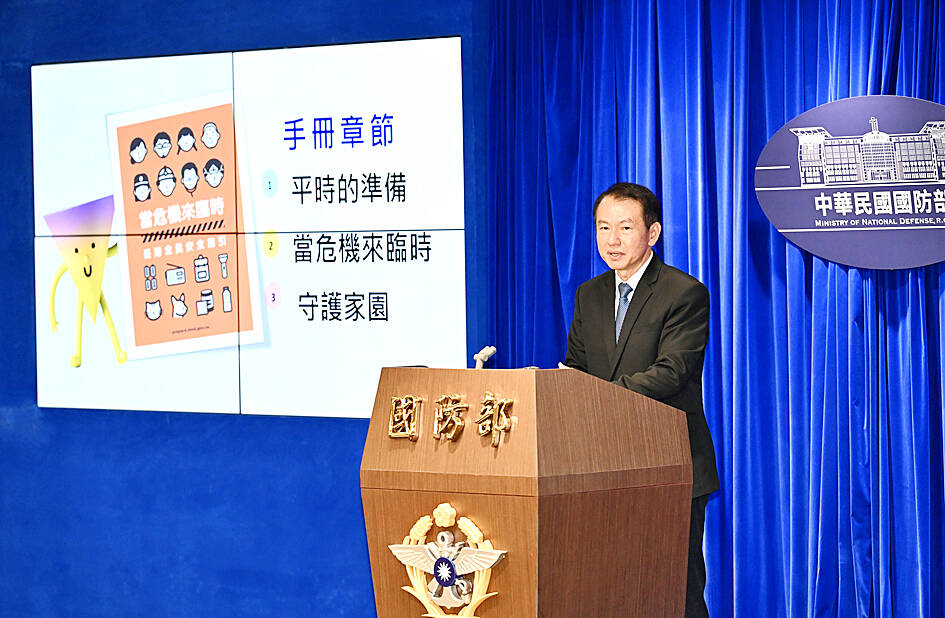More than 5,600 sites across Taiwan have been designated as stations to supply daily necessities in case of a crisis, a Ministry of National Defense official said yesterday, adding that there is also the possibility of cooperation with convenience stores and supermarkets.
When a crisis occurs, the government would do its utmost to maintain stability in people’s livelihoods and the economy, and provide essential goods to everyone through a comprehensive rationing system, All-out Defense Mobilization Agency Director Shen Wei-chih (沈威志) told a news conference where the updated civil defense handbook was introduced.
The main goal of whole-of-society defense resilience is to maintain the government’s normal operations during a crisis, ensuring that daily life continues as usual, Shen said.

Photo: Lo Pei-de, Taipei Times
The government planned 5,668 stations across Taiwan, he said.
The stations would be crucial for people’s livelihoods in case of an emergency, he said, adding that they would stock rice, cooking oil, salt, gas and infant formula among others.
Ministry of Economic Affairs official Wang Chi-ming (王啟明) said that his ministry plans to combine private-sector efforts, and hopes to take advantage of widespread convenience stores and supermarkets to conduct rationing operations.
It has already made preliminary contact with PX Mart, Wang said.
Lieutenant General Huang Wen-chi (黃文啟), head of the Department of Strategic Planning, said that in view of China’s increasing maritime blockade capabilities, it is imperative to enhance the stockpile of wartime supplies.
Minister of National Defense Wellington Koo (顧立雄) has instructed that wartime supply stockpiles be increased from 30 days of rations to 120 days to improve combat readiness, Huang said.
“Our priority [wartime supply] is fuel and drinking water,” Huang said.
Other items such as spare parts, ammunition and rations, require special storage conditions, so portions of a special budget would be allocated to building storage facilities and other infrastructure, he said.
The supply stockpiles would be continuously reviewed and adjusted to maintain sustained combat capability, he said.
Wartime stockpiles refer to military supplies planned and stored based on operational concepts to support the entire duration of combat, the defense ministry said.

Taiwan has received more than US$70 million in royalties as of the end of last year from developing the F-16V jet as countries worldwide purchase or upgrade to this popular model, government and military officials said on Saturday. Taiwan funded the development of the F-16V jet and ended up the sole investor as other countries withdrew from the program. Now the F-16V is increasingly popular and countries must pay Taiwan a percentage in royalties when they purchase new F-16V aircraft or upgrade older F-16 models. The next five years are expected to be the peak for these royalties, with Taiwan potentially earning

STAY IN YOUR LANE: As the US and Israel attack Iran, the ministry has warned China not to overstep by including Taiwanese citizens in its evacuation orders The Ministry of Foreign Affairs (MOFA) yesterday rebuked a statement by China’s embassy in Israel that it would evacuate Taiwanese holders of Chinese travel documents from Israel amid the latter’s escalating conflict with Iran. Tensions have risen across the Middle East in the wake of US and Israeli airstrikes on Iran beginning Saturday. China subsequently issued an evacuation notice for its citizens. In a news release, the Chinese embassy in Israel said holders of “Taiwan compatriot permits (台胞證)” issued to Taiwanese nationals by Chinese authorities for travel to China — could register for evacuation to Egypt. In Taipei, the ministry yesterday said Taiwan

‘LIKE-MINDED PARTNER’: Tako van Popta said it would be inappropriate to delay signing the deal with Taiwan because of China, adding he would promote the issue Canadian senators have stressed Taiwan’s importance for international trade and expressed enthusiasm for ensuring the Taiwan-Canada trade cooperation framework agreement is implemented this year. Representative to Canada Harry Tseng (曾厚仁) in an interview with the Central News Agency (CNA) said he was increasingly uneasy about Ottawa’s delays in signing the agreement, especially as Ottawa has warmed toward Beijing. There are “no negotiations left. Not only [is it] initialed, we have three versions of the text ready: English, French and Mandarin,” Tseng said. “That tells you how close we are to the final signature.” Tseng said that he hoped Canadian Prime Minister Mark Carney

POSITIVE DEVELOPMENT: Japan and the US are expected to hold in-depth discussions on Taiwan-related issues during the meeting next month, Japanese sources said The holding of a Japan-US leaders’ meeting ahead of US President Donald Trump’s visit to China is positive news for Taiwan, former Japan-Taiwan Exchange Association representative Hiroyasu Izumi said yesterday. After the Liberal Democratic Party’s landslide victory in Japan’s House of Representatives election, Japanese Prime Minister Sanae Takaichi is scheduled to visit the US next month, where she is to meet with Trump ahead of the US president’s planned visit to China from March 31 to April 2 for a meeting with Chinese President Xi Jinping (習近平). Japan and the US are expected to hold in-depth discussions on Taiwan-related issues during the